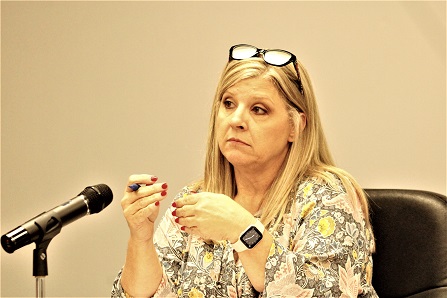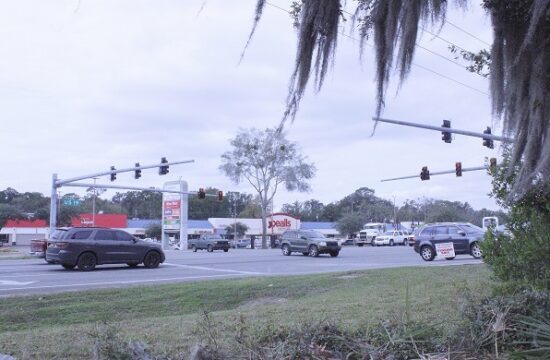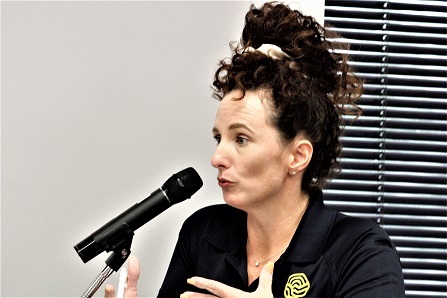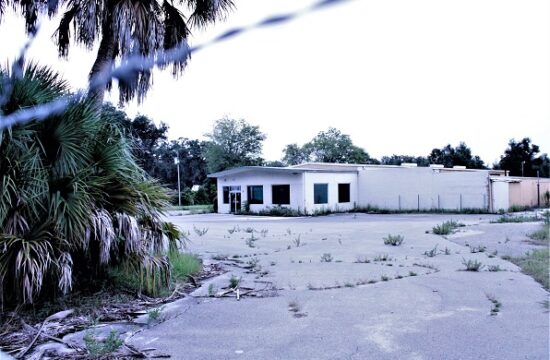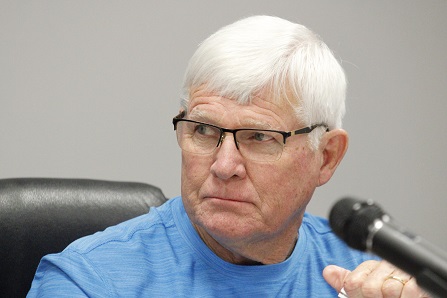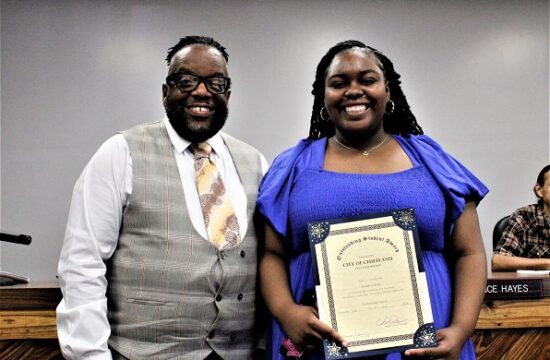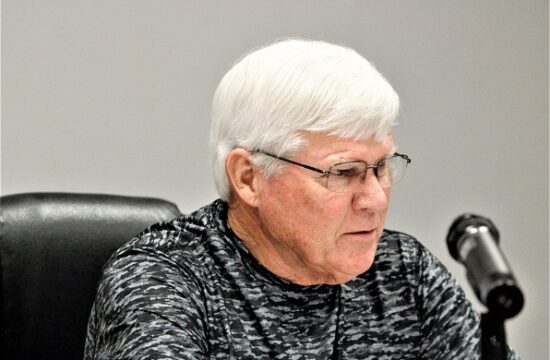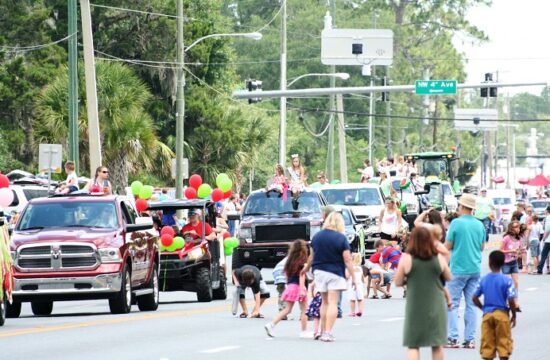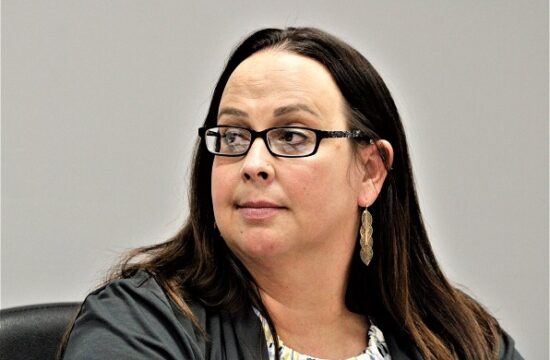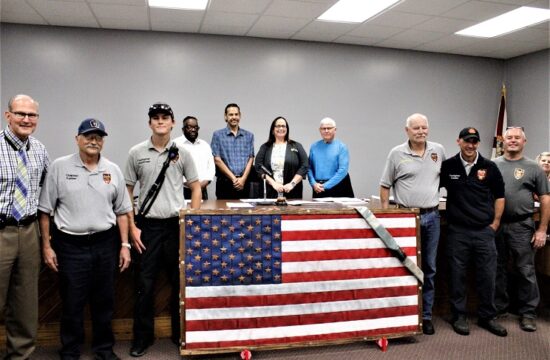By Terry Witt – Spotlight Senior Reporter
A Chiefland community leader expressed grave concerns Monday night about the potential impact on the community and its businesses if the Florida Department of Transportation builds a bypass road around the city.
Andrea Knuckles, a fifth-generation Levy County resident, said she can’t bear the thought of Chiefland’s businesses slowly withering away and dying because the state wants to promote the free flow of traffic around the city.
Knuckles, daughter of a Chiefland farm family and a longtime businesswoman, strongly encouraged Chiefland City Commissioners to pay close attention to the DOT Project Development and Engineering study that could kill downtown Chiefland if it’s done without sensitivity to local concerns.
“If you bypass our town we’re going to be in trouble. This city is going to be in trouble,” Knuckles said. “I know you don’t want to slow traffic so you want it to speed right past us, but once people go by us, they don’t turn around and come back. We know that. I’ve seen cities die like that.”
Knuckles was speaking as a concerned lifetime resident of Chiefland when she directed her remarks to Ryan Asmus, chief engineer for the PD&E study. The study, according to Asmus, is intended to protect the free flow of traffic on U.S. 19.
Asmus invited commissioners and members of the public to attend a meeting today at the College of Central Florida north of Chiefland from 5:30 p.m. to 7:30 p.m. aimed at providing residents with information about the study and giving them a chance to ask questions and provide verbal and written comments.
There will be no presentation by a guest speaker at the meeting. DOT plans to set up information boards describing the project. DOT staff will stand near the boards to answer questions. In past meetings of this sort, DOT has refused to answer questions from the Press when they approached DOT staff standing next to the information boards. The Press was directed to contact a public information officer in Tallahassee who, as it turned out, wasn’t taking news media calls.
Asmus said the traffic study is intended to find points of conflict that stop or slow traffic flow. Traffic signals, median openings, right turn lanes to turn off U.S. 19 or enter the highway are conflict points.
“Our project will consider a variety of options we call alternatives, such as acceleration lanes, increasing the distance between median openings, interchanges, overpasses, bypasses, and that’s what we’re going to be looking at in the next steps. We’re just kicking the study off. The department’s committed to transparency and we want to be good partners. We’ll work with you and all of our local communities as we develop options for free flow of traffic options and solutions. We want to make sure it aligns with the communities’ needs and goals to ensure transparency and foster partnerships,” Asmus said.
After gathering input from residents and local governments, Asmus said DOT will return to the community with proposed refinements to the plans based on the input the agency received.
Knuckles said she remains concerned about what could happen to Chiefland if the highway is redesigned to take traffic away from the town.
“This my home. I’ve been here five generations deep and I don’t want to see our city destroyed because down south is getting so many people and so much traffic that we destroy towns to help people that are moving down south,” she said. “My city’s important to me. I don’t want to see it destroyed.”
Commissioner Norm Weaver, who moved to Chiefland after retiring in central Florida, asked Knuckles, “What do you think should happen?”
“What do I think should happen,” Knuckles responded. “I don’t want to see our city destroyed.’
She said she is worried about whether the bypass would be constructed east of town and near NW 140th Street because it could destroy their family farm.
“The bypass is most likely going to happen because we (the city and its traffic lights) would definitely slow traffic on U.S. 19,” she said. “So, would the bypass go on that side (the east side), and how many on that side would lose their land and homes? If it goes on the other (west side, we’re in the Suwannee River Basin. Would it take our Hardeetown? You can’t go to the river because you have too much low-lying wetlands. It’s something to seriously think about – pay attention commissioners. I’m just asking you all to be very aware, to pay attention to what’s going to happen in this area and it’s not just one thing, it’s many things.”
Mayor Chris Jones said Knuckles brought up a valid point. Looking back at the city’s history, Jones said when the state installed a turnoff in front of Chiefland Middle High School, he said it impacted businesses in the nearby shopping center, including TG&Y and Eckerds, which moved farther north.
“That basically killed the south end of Chiefland. Businesses just slowly went under and migrated north, so that’s a very valid point that needs to be handled by this commission. I think the public needs to make suggestions on how they feel, but I agree with you,” Jones said.
Hardeetown is the oldest neighborhood in Chiefland. It lies on the north end of town along what was formerly the railroad tracks. The railroad tracks have been converted to the Nature Coast State Trail, a popular hiking and biking trail extending from the old railroad depot in south Chiefland to Cross City.
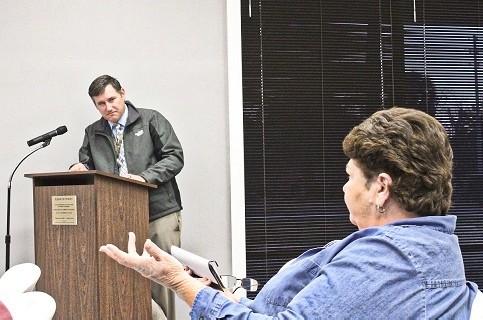
———————
City of Chiefland Regular Meeting February 14, 2022; Posted February 15, 2022



